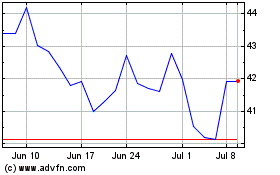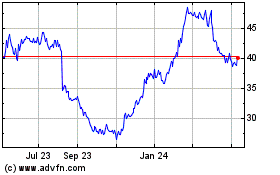Tapestry, Inc. (NYSE: TPR), a leading New York-based house of
modern luxury accessories and lifestyle brands, today
announced it has signed the Women’s Empowerment Principles
Charter, a joint initiative of UN Women and the UN Global Compact
(UNGC), providing guidance for promoting gender equality in the
workplace through a set of seven Principles. Established to
champion the development of women, businesses are encouraged to
implement these Principles, which include establishing high-level
corporate leadership for gender equality, promoting education,
training and professional development for women, and promoting
equality through community initiatives and advocacy.
Victor Luis, Chief Executive Officer of Tapestry, Inc., said, “I
am thrilled to be signing the Women’s Empowerment Principles
Charter on behalf of Tapestry, Inc. on International Women’s Day.
At Tapestry, inclusivity is core to our values. The importance of
gender equality and the continued conversation around this critical
topic needs to come from the top. Three of our nine Board Directors
are women, and women hold 60 percent of leadership positions within
our organization. In an era where issues of gender, race and sexual
orientation receive mass media attention, our commitment to the
Women’s Empowerment Principles reaffirms our belief that anyone,
from anywhere, can have a great idea. At Tapestry, success is based
on merit – nothing else.”
Phumzile Mlambo-Ngcuka, Under-Secretary-General and Executive
Director, UN Women added, “The 2030 Agenda for Sustainable
Development envisages for us a world where no one is left behind,
where every woman, man, girl and boy is able to live up to their
full potential. If you wonder why gender equality is so important,
just try to think of any part of the world, or even any business,
where it’s possible to say that we’ve already achieved it. Whether
you consider equal pay for women when they do the same job as a
man; a balanced group of decision makers bringing their experience
to bear on an issue in boardrooms or parliaments; or women’s full
engagement in peace processes; in every case, there are gaps that
are holding us back from achieving the 2030 Agenda vision of an end
to poverty and a peaceful, sustainable world. Those gaps are the
spaces where women – and girls – are missing. The WEPs can make a
direct and substantive impact on empowering women and closing those
gaps.”
In October 2018, Tapestry signed the UN Global Compact, which
initiated the Company’s engagement with the UN.
Tapestry’s participation in the UN Global Compact builds upon
established Corporate Responsibility (CR) programs. In 2001, the
first year as a public company, Tapestry published its Supplier
Code of Conduct, as well as a Social Auditing Program, both
focusing on social and environmental compliance, solidifying the
expectations placed upon suppliers regarding fair working
conditions, wages and safety. The Social Auditing Program for
factory compliance set high standards within the luxury
industry.
Tapestry instituted its formal Sustainability Program in 2013,
and in 2015, introduced the first set of Corporate Responsibility
goals -- targets that focus on climate change, water, waste
management and social issues, reporting progress annually.
For more information on Tapestry’s Corporate Responsibility
program, please visit
https://tapestry.gcs-web.com/sustainability-reports.
About UN Women
UN Women is the United Nations entity dedicated to gender
equality and the empowerment of women. A global champion for women
and girls, UN Women was established to accelerate progress on
meeting their needs worldwide.
About the Women’s Empowerment Principles
The Women's Empowerment Principles offer seven steps to guide
businesses on how to empower women in the workplace, marketplace
and community. Subtitled, Equality Means Business, the Principles
emphasize the business case for corporate action to promote gender
equality and women's empowerment, and are informed by real-life
business practices and input gathered from across the globe. Rather
than being prescriptive or a new initiative to which businesses are
asked to subscribe, the WEPs seek to point the way to best
practices by elaborating the gender dimensions of good corporate
citizenship, the UN Global Compact and business role in sustainable
development. To date, more than 2,180 business leaders from around
the world have signed a CEO Statement of support for the WEPs,
confirming their commitment towards the advancement and empowerment
of women, and towards the best practices highlighted by the seven
Principles.
About the UN Global Compact
The UN Global Compact is a corporate sustainability initiative
that aligns businesses, strategies and operations with ten
principles on human rights, labour, environment and
anti-corruption. It encourages participants to take actions to
advance societal goals, such as the UN Sustainable Development
Goals. Established in 2000, the UN Global Compact emphasizes
collaboration and innovation between participants, the greater
community and governments, and is present in over 160 countries and
more than 80 local networks.
About Tapestry, Inc.
Tapestry, Inc. is a New York-based house of modern luxury
lifestyle brands. The Company’s portfolio includes Coach, Kate
Spade and Stuart Weitzman. Our Company and our brands are founded
upon a creative and consumer-led view of luxury that stands for
inclusivity and approachability. Each of our brands are unique and
independent, while sharing a commitment to innovation and
authenticity defined by distinctive products and differentiated
customer experiences across channels and geographies. To learn more
about Tapestry, please visit www.tapestry.com. The Company’s common
stock is traded on the New York Stock Exchange under the symbol
TPR.
This information to be made available in this press release may
contain forward-looking statements based on management's current
expectations. Forward-looking statements include, but are not
limited to, statements that can be identified by the use of
forward-looking terminology such as "may," "will," “can,” "should,"
"expect," "intend," "estimate," "continue," "project," "guidance,"
"forecast," “outlook,” "anticipate," “moving,” “leveraging,”
“capitalizing,” “developing,” “drive,” “targeting,” “assume,”
“plan,” “build,” “pursue,” “maintain,” “on track,” “well positioned
to,” “look forward to,” “to acquire,” “achieve,” “strategic
vision,” “growth opportunities” or comparable terms. Future results
may differ materially from management's current expectations, based
upon a number of important factors, including risks and
uncertainties such as expected economic trends, the ability to
anticipate consumer preferences, the ability to control costs and
successfully execute our transformation and operational efficiency
initiatives and growth strategies and our ability to achieve
intended benefits, cost savings and synergies from acquisitions,
the impact of tax legislation, etc. Please refer to the Company’s
latest Annual Report on Form 10-K and its other filings with the
Securities and Exchange Commission for a complete list of risks and
important factors. The Company assumes no obligation to revise or
update any such forward-looking statements for any reason, except
as required by law.
View source
version on businesswire.com: https://www.businesswire.com/news/home/20190308005147/en/
Tapestry, Inc.Analysts & Media:Andrea Shaw ResnickInterim
Chief Financial OfficerGlobal Head of Investor Relations and
Corporate Communications212/629-2618aresnick@tapestry.com
Aimée LeabonDirector, Corporate
Communications212/615-2040aleabon@tapestry.com
Tapestry (NYSE:TPR)
Historical Stock Chart
From Mar 2024 to Apr 2024

Tapestry (NYSE:TPR)
Historical Stock Chart
From Apr 2023 to Apr 2024
